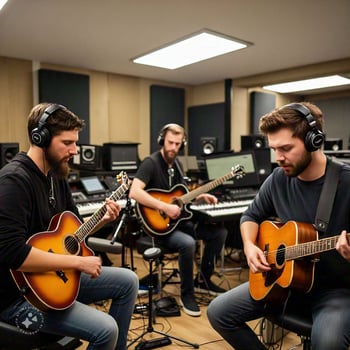Uncovering Hidden Lessons of Music Education: A Sure Gateway for Students’ Success
Hidden Lessons of Music Education explores how music prepares students to face the real world. Music enriches the students' lives and is a key to holistic living
MUSIC IN EDUCATION
edubeatsworld
10/23/2024


Uncovering Hidden Lessons of Music Education: A Sure Gateway for Students’ Success
Although music education is often seen as an enjoyable extracurricular activity, many people are unaware of its benefits beyond entertainment. Music imparts lessons in a unique way, different from the traditional subjects taught in schools. In this discussion, we will explore how music prepares students to face the real world.
1. Develops self-discipline and commitment in life.
"Discipline is the bridge between goals and accomplishment." – Jim Rohn
When students learn to play a musical instrument, they naturally develop the skill of discipline in their lives. This discipline influences all areas of their existence, whether it involves completing school assignments or pursuing personal goals. Their focus sharpens as they commit to achieving their objectives, and along the way, they also cultivate other important qualities such as perseverance, determination, and dedication, which contribute to their overall happiness and success.
For example, a student striving to master the violin must practice regularly. This commitment fosters discipline, which can then be applied to other aspects of their life.
2. Enhances leadership and teamwork skills.
"Music can change the world because it can change people." – Bono
Musical performance, whether in a choir, band, or orchestra, requires students to work as part of a team. They must share their knowledge and expertise of their musical instruments, blending different sounds into a cohesive performance. A strong team of band members can perform well and achieve a harmonious musical experience.
Through these activities, students develop leadership skills by monitoring and directing their peers during performances. This involvement enhances their communication abilities and helps them make quick, effective decisions.
A 2016 study conducted by the University of Toronto found that students involved in musical performances cultivate better teamwork and leadership skills compared to those who do not participate.


3. Improves emotional intelligence and fosters a sense of empathy.
"Music expresses that which cannot be said and on which it is impossible to be silent." – Victor Hugo
"Music is the divine way to tell beautiful, poetic things to the heart." – Pablo Casals
Music transcends languages and boundaries, uniting people across nations and continents. It has the unique ability to reach the hearts and minds of individuals throughout history, evoking a range of emotions and conveying various meanings. When students participate in performances with other band or choir members, their emotional intelligence and empathy are enhanced as they strive to interpret and communicate the emotions behind their music.
A student who plays a musical piece must interpret and express the emotions intended by the composer to earn the audience's goodwill and appreciation. As students collaborate in musical performances, they develop a deeper understanding of one another's feelings, strengthening their relationships and creating lasting bonds.
A study published in Frontiers in Psychology highlighted that students involved in music show greater emotional understanding compared to those who are not.
4. Promotes adaptability and enhances problem-solving skills
"The measure of intelligence is the ability to change." – Albert Einstein
Students who pursue music face a variety of challenges that enable them to constantly evolve and adapt. Whether it's tackling a difficult composition or performing on stage, these hurdles help students grow and develop their skills. While it may seem daunting, overcoming a challenging piece is incredibly rewarding. Regular, slow, and methodical practice gradually builds speed and confidence.
This ability to adapt fosters quick thinking and problem-solving skills. Musicians learn to think creatively when they encounter difficulties, making them more resilient and resourceful.
Confronting new challenges allows students to grow and develop in their musical journeys. As they embrace complexity and step out of their comfort zones, they reach new heights in their musical abilities.


5. Fosters Confidence and Resilience
"Confidence is not something that comes out of nowhere. It’s the result of something… hours and days and weeks and years of constant work and dedication." – Roger Staubach
Performing music can often be a challenging experience for students. However, as they step out of their comfort zones, they develop important life skills that build their confidence and resilience. Students learn to cope with and manage their anxiety as they confront their fears, and over time, they become more comfortable performing in front of larger audiences.
Constructive feedback from teachers and peers helps them improve their skills and become better musicians. The confidence gained from enhanced music performances often transfers to other areas of their lives, such as academics and extracurricular activities.
Students who have successfully performed at a school concert or completed a solo performance may find it easier to deliver presentations or participate in debates, as they have already faced the challenges of performing in front of others. They are more likely to take on leadership roles and engage in public speaking, demonstrating a greater ability to manage stress and perform under pressure.
A study published in the 2015 Journal of Educational Psychology found that students participating in music programs exhibited significantly higher levels of self-confidence and resilience compared to their peers.
Conclusion
Music education goes beyond just learning to play an instrument or sing; it serves as a powerful tool that equips students with essential life skills for tackling the complexities of the real world.
Through music, students develop leadership qualities, teamwork, confidence, resilience, emotional intelligence, empathy, adaptability, and decision-making skills. These attributes stem from the self-discipline and commitment required in music practice, helping shape well-rounded individuals prepared to face life's challenges.
While we continue to prioritize academic performance, it is crucial to recognize that music education fosters active listening and mutual respect among students. Collaborating with others in a group setting teaches them to adjust and work toward a common goal, highlighting the value of music as a key component of holistic education.
Ultimately, music education plays a vital role in preparing students for success in life, shaping them into well-rounded and compassionate individuals
contact@edubeatsworld.com
© 2024. All rights reserved.
